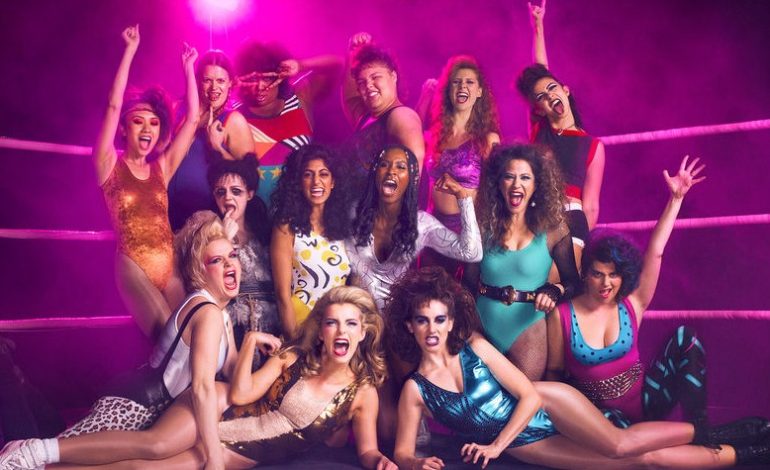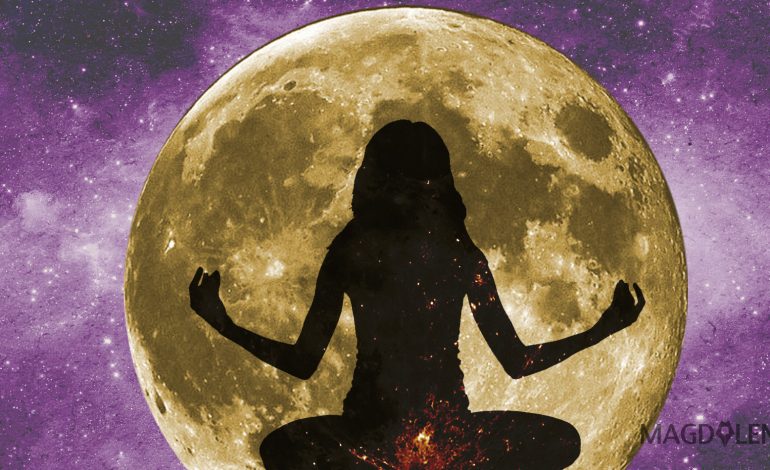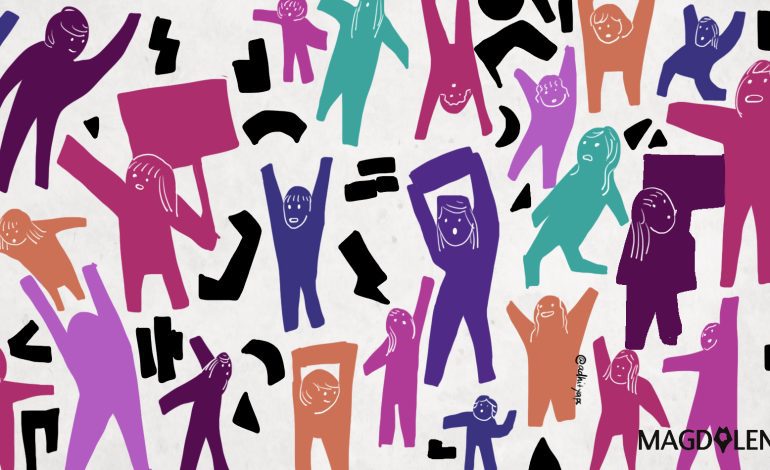Women’s Agency in Women Wrestling Series G.L.O.W

[SPOILER ALERT]
Under a spotlight, two women in spandex are standing face to face, grunting, ready to “powerslam” one another. The audience cheers one and boos the other. The winner is, of course, pre-destined, the moves choreographed. But these facts do nothing to tamper audience’s enthusiasm.
“It’s a porn you can watch with your kids,” Sam Sylvia (played by Marc Maron), the director of the wrestling show on stage, sums it up.
It is easy to dismiss women’s wrestling show as simply sexist, another agent of male gaze in the television industry. However, Netflix’s recent television series G.L.O.W offers a new lens for us to see what the show actually means for the women involved.
Produced as a fictional backstory of the U.S. original women wrestling show in the 80s, the Gorgeous Ladies of Wresting, Netflix’s G.L.O.W dives into the women wrestlers’ lives during the era of spandex, big hair, and neon lights. Created by Jenji Kohan, Liz Flahive, and Carly Mensch, G.L.O.W’s overall plot circles around fourteen young women who are struggling in their search of life purpose and fortune.
Set in the 80s Los Angeles, the story firstly zooms in at a young emerging actress named Ruth Wilder (Alison Brie), who is in the middle of narrating a dramatic powerful monologue about justice and about “not being bullied into submission.”
When she finished, the casting lady told her: “You’re reading the man’s part!”
So she reads the line that she is to audition for: “Sorry to interrupt, your wife is on line two.”
This pretty much portrays the limited representation of women in the media at the time. Ruth is a driven, ambitious and passionate individual, but living in a time and working in an industry in which a woman’s place is still limited. Flat broke, Ruth is forced to abandon her ambition and take a detour for some cash in women’s wrestling.
There she will meet several other women, all of whom will end up finding a refuge in the sport they barely know about.
This premise corresponds with the real situation in the making of the ‘80s reality show G.L.O.W, during which none of the women casts had been a professional wrestler. They were either a dancer, singer, model, or actress.
From then on, the women who pass the audition go through a process in which they are molded into ridiculous, reductive, and often inappropriate stereotypes. A Cambodian-American becomes the token Chinese martial artist “Fortune Cookie”, Ruth takes on a Russian antagonist persona “Zoya the Destroya”, and an Indo-American woman becomes a Middle-Eastern terrorist “Beirut the Mad Bomber”. The level of political incorrectness shoots up the roof when in one scene, two white women dressed in the white robes of the white supremacist group Ku Klux Klan are fighting against two black women.
Everybody is assigned a partner as their practice opponent, and their roles are divided into “heroes” and “heels”. It is unnerving to know that this kind of reality show really existed and was hugely popular in just over three decades ago. But Netflix’s G.L.O.W lets us see what was then overlooked: the women wrestlers who strive and work hard while also looking out for each other.
During an interview with Vanity Fair, the co-creators Mensch and Flahive explained that what differentiates their show from the 80s G.L.O.W is the point of view of the maker. They said that the creators heavily affect how the show is going to be framed, shot, and presented to the public. The original G.L.O.W which was created by a man tends to hypersexualize the women for the sake of male gaze, while the “new” G.L.O.W intends to pass the power back to the women. In the retelling version, women agency seems to be one of the main highlights.
In feminist social-political philosophy, “women agency” refers to one’s capability to make a free independent choice. It is about how women in a male-dominated society decide to live in the way that reflect their genuine needs and establish active resistance against social constructs/pressure.
Throughout the 10 episodes of G.L.O.W, we’ve got to see each of the women deciding for themselves, though it often means rebelling against their family.
One of the characters, Carmen Wade (Britney Young), is a young woman born in a professional wrestling family. She never gets the chance to continue the legacy of her family just because she’s a female. Her legendary wrestler father opposes the idea of her following in his footsteps, envisioning his daughter living safely in the comfort of marriage. But Carmen refuses to back off. She trains together with the other women and claims her persona as a gentle Peruvian giant called “Machu Picchu”. Witnessing her determination, her family ends up supporting her choice.
Ruth’s best friend and former successful actress, Debbie Eagan (Betty Gilpin), also finds it liberating to be able to explore her physical strength after being idle for some time after marriage. Spending her days mothering a newborn baby and taking care of domestic matters, women wrestling reminds her of how good she used to be at what she’s doing. Although her cheating husband objects the idea of her joining the show, Debbie eventually decides for herself where she truly belongs.
And then there is Sheila (Gayle Rankin), an antisocial who wears heavy gothic make-up on and big black wig on a daily basis, and who genuinely believes she is spiritually a wolf. Having run away from home, Sheila eventually finds real friendship and acceptance living among her fellow wrestlers.
A former wrestler of the 80s G.L.O.W, Carmen Campbell-Villalobos, said in an interview with Twin Cities Live that the Netflix’s remake is 7 out of 10 accurate in representing the actual event
“I watched all the 10 episodes with my daughter and it was funny. It was somewhat true to what was going on with us,” she said. While being quarantined at Hotel Riviera, the ladies used to practice six hours a day and would performed live on Saturdays, she recalled.
“…and Marc Maron—he’s pretty much taking the character of Matt Cimber, our director. I mean, he was also a bit of an [silently uttering] ‘a-hole’,” Campbell-Villalobos said.
Carmen said her main motivation in joining the show was financial, just like the main character Ruth: “We were desperate for money at the time. We were young, just twenty-one.” And it was true, she confirmed, that people who usually came to watch the live show brought along their kids.
“It was a form of empowerment, of course. We all [former wrestlers] still talk to each each other. We also still talk to our fans,” she added.
Indonesia’s TV and film industry can learn a thing or two from this show. When Hollywood has begun to step up in the past few years, our TV and film industry still thrives on story lines that promote patriarchal values, normalize domestic abuse and succumb to traditional gender roles. We also badly need to replace the caricature hysterical and stereotypes-rife female characters on TV and films with those who are genuine and realistically complex. But, in order for change to happen, we must first let the industry know, we want no more of the trash they serve up and call “entertainment”.
Title: G.L.O.W.
Creators: Jenji Kohan, Liz Flahive, Carly Mensch
Release date: June 23rd, 2017
Network: Netflix
Genre: Drama, Comedy
Casts: Alison Brie, Marc Maron, Betty Gilpin
Find out about the economic impacts of child bearing and breastfeeding.






















